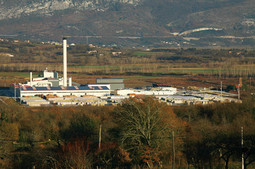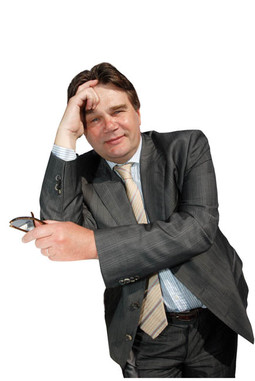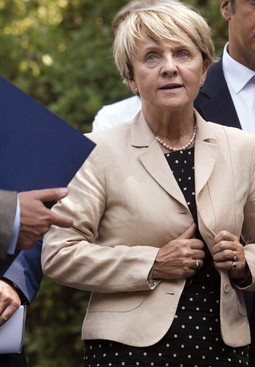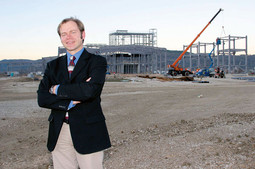Published in Nacional number 638, 2008-02-05
ISTRIA COUNTY PREFECT ISSUES ULTIMATUM
'Rockwool needs to shape up or it won't operate in Istria'
ISTRIA COUNTY PREFECT IVAN JAKOVCIC distanced himself from Danish-based Rockwool a few days ago in Brussels, a company whose factory in the Istrian town of Potpican has been at the centre of a scandal centred on pollution released into the environment during test-running
 THE ROCKWOOL FACTORY in Istria was to have been, according to announcements from the Danish multinational, equipped with one of the world's most efficient technological environmental preservation systems and in line with the highest standards Istrian County Prefect Ivan Jakovcic slammed the Rockwool Company while in Brussels a few days ago, distancing himself from the Danish multinational rock wool insulation manufacturer. Jakovcic spoke very critically of Rockwool at a meeting with representatives of the European Commission, whom he visited shortly after the European Commission had indirectly lobbied in favour of Rockwool. The position Jakovcic has taken shows that Rockwool no longer has political support at the local Istrian level, where that support is most important.
THE ROCKWOOL FACTORY in Istria was to have been, according to announcements from the Danish multinational, equipped with one of the world's most efficient technological environmental preservation systems and in line with the highest standards Istrian County Prefect Ivan Jakovcic slammed the Rockwool Company while in Brussels a few days ago, distancing himself from the Danish multinational rock wool insulation manufacturer. Jakovcic spoke very critically of Rockwool at a meeting with representatives of the European Commission, whom he visited shortly after the European Commission had indirectly lobbied in favour of Rockwool. The position Jakovcic has taken shows that Rockwool no longer has political support at the local Istrian level, where that support is most important.
Jakovcic in fact feels that Rockwool should abandon the Potpican area and build a rock wool production facility at some other location, but is unwilling to confirm that for the moment. It is most likely this position that is behind Jakovcic's dramatic January 25 statements at the offices of the European Commission. Jakovcic's statements are another hard blow to Rockwool.
 IDS leader Ivan Jakovcic Jakovcic was in Brussels as the president of the Adriatic Euroregion delegation and on 24 January met there with Danuta Hübner, the European Commissioner for regional development. He presented her with 21 joint projects on the Adriatic in the fields of tourism, agriculture, infrastructure, transport, environmental protection and fisheries for which he expects the support of the European Commission. He was there for two days, and the newspapers wrote only in brief of his visit to the seat of the European Commission, and the details of the dramatic meeting that took place there on 25 January remain unknown to this day. On the second day of his visit to Brussels Jakovcic visited David Daly, the head of the Department for Croatia at the European Commission's General Administration for Enlargement. He visited him above all because a letter was sent to Croatia in January from the office of Christian Danielsson, director of the European Commission General Administration for Enlargement, which underlined that the Danish investor was interested in finding a "quick resolution" for its factory in Potpican. The letter expressed the view that stopping one of the biggest Greenfield investments could have a negative influence on the legal security of investors, an area in the particular focus during Croatian EU accession negotiations. An opinion thus formulated was seen in Croatia as inappropriate pressure from the European Commission in favour of Rockwool, not long after construction inspectors of the Ministry of Environmental Protection, Physical Planning and Construction on 23 November 2007 shut down the Rockwool factory in Potpican because of violations of limits stated in its construction permit and environmental impact study. The letter was a source of indignation for Jakovcic.
IDS leader Ivan Jakovcic Jakovcic was in Brussels as the president of the Adriatic Euroregion delegation and on 24 January met there with Danuta Hübner, the European Commissioner for regional development. He presented her with 21 joint projects on the Adriatic in the fields of tourism, agriculture, infrastructure, transport, environmental protection and fisheries for which he expects the support of the European Commission. He was there for two days, and the newspapers wrote only in brief of his visit to the seat of the European Commission, and the details of the dramatic meeting that took place there on 25 January remain unknown to this day. On the second day of his visit to Brussels Jakovcic visited David Daly, the head of the Department for Croatia at the European Commission's General Administration for Enlargement. He visited him above all because a letter was sent to Croatia in January from the office of Christian Danielsson, director of the European Commission General Administration for Enlargement, which underlined that the Danish investor was interested in finding a "quick resolution" for its factory in Potpican. The letter expressed the view that stopping one of the biggest Greenfield investments could have a negative influence on the legal security of investors, an area in the particular focus during Croatian EU accession negotiations. An opinion thus formulated was seen in Croatia as inappropriate pressure from the European Commission in favour of Rockwool, not long after construction inspectors of the Ministry of Environmental Protection, Physical Planning and Construction on 23 November 2007 shut down the Rockwool factory in Potpican because of violations of limits stated in its construction permit and environmental impact study. The letter was a source of indignation for Jakovcic.
He spoke with Daly for 45 minutes. Actually only Jakovcic spoke the entire time, about Rockwool, very critically, forcefully and emotionally. He presented his host with a chronology of the difficulties related to Rockwool's investment in Istria and called the Danish rock wool producer a symbol of environmental pollution in Istria.
"I told Daly that either Rockwool should get its act together or it won't operate in Istria. A factory that pollutes the environment and does not respect European standards cannot operate in Istria. I told Daly that political pressure, when it came to protecting the environment, would not bear fruit, and that this should be made clear to all", Ivan Jakovcic told Nacional. Daly did not pressure Jakovcic in any way and he got the impression that Daly was interested in what he had to say and in the arguments he presented, Jakovcic was satisfied with the meeting."I have the impression that I succeeded in convincing him that there was no sense in the European Commission demanding maximum effort in environmental protection in the negotiations and that it at the same time lobbies in favour of an EU business that damages the environment. I told Daly that a lot is being invested in Istria in protecting the environment, in wastewater and refuse management projects and that the philosophy driving our peninsula will not tolerate polluters, that there are cement factories, thermal power plants and similar producers in Istria that do not abide by environmental protection codes. I told him that we are aware that there is no development without industry, but that with our low rate of unemployment, which in Istria is about 5 percent, we have no need for that kind of industry", Jakovcic said. Daly did not oppose Jakovcic's arguments, nor did he defend the interest of Rockwool. And that is why Jakovcic is convinced that the European Commission will not intervene again in the Rockwool case.
It is particularly embarrassing for Rockwool that Jakovcic feels that their factory should in fact be moved from Potpican to some other location, even though Jakovcic is unwilling for the moment to go on the record with this position.
Jakovcic was invited by the local population to come and live with a Potpican family during Rockwool factory test runs so that he could see first hand just how much the factory pollutes the environment, something he intends to do.
 DANUTA HÜBNER, the European Commissioner for Regional Development, met with Ivan Jakovcic on 24 January Jakovcic expected a much more serious approach of Rockwool for an investment of this scale and had not anticipated that the company would launch the project so poorly, immaturely, disparagingly and unprofessionally. Jakovcic, just like the local population, feels cheated. But some of the local population feels that Jakovcic shares a part of the responsibility for the problems with Rockwool. They feel that Jakovcic backed Rockwool in some initial phases of the project that lacked transparency, and that his belated efforts are only directed at political damage control.
DANUTA HÜBNER, the European Commissioner for Regional Development, met with Ivan Jakovcic on 24 January Jakovcic expected a much more serious approach of Rockwool for an investment of this scale and had not anticipated that the company would launch the project so poorly, immaturely, disparagingly and unprofessionally. Jakovcic, just like the local population, feels cheated. But some of the local population feels that Jakovcic shares a part of the responsibility for the problems with Rockwool. They feel that Jakovcic backed Rockwool in some initial phases of the project that lacked transparency, and that his belated efforts are only directed at political damage control.
On the other hand, people close to Jakovcic say that he was initially quite reserved about the project, and that he had supported the project at the insistence of local authorities, whose approval and support Rockwool had "bought" with many promises it later failed to honour. The local population has persuaded Jakovcic that the factory was very good for local development. Initially everything appeared perfect, Rockwool was welcomed at all levels of local and national administration, it received numerous incentives, and purchased land for next to nothing. When test runs were made at the factory, however, problems began to crop up. It was unbearable in Potpican those days. Later it turned out that Rockwool had done many things on its own initiative in the project, manipulating with project documentation and the environmental impact study. Additional problems were created by the fact that the micro-climate in the area is an area with fog retention, but also harmful gases and smoke produced by the factory where in operation. Local environmental protection groups started warning again of the controversial "secret contract" on the sale of land between the investor, Rockwool Adriatic, the municipality of Pican and the Istrian Development Agency. Some of the provisions of that deal are a cause of serious doubts that construction of the factory was in fact agreed upon before the procedure stipulated by law had been carried out, including a public debate, with unbelievable and illogical concessions to the investor. The contract also cites numerous obligations of the local administration pertaining to getting the factory into the zoning plan, acquiring all the necessary permissions for construction, providing infrastructure. Especially contentious are provisions of the contract whereby if any of the articles of the contract are violated, from changes in the zoning pan to the issue of construction permits, Rockwool is to be paid damages, while the investor, aside from the obligation to pay about 960,000 euro for the land, has no obligation to pay any damages if it backs out of the project. Of particular interest is the annex on incentives to the investor to the tune of 17 million euro. The municipality of Pican did not receive the 2.5 million euro difference between the sale and market price of the land, and the investor has been waived the obligation to pay municipal fees of 3.6 million euro.
 BARTOSZ STENTOFT, the Rockwool regional director, told Nacional in 2006 that the environment was an absolute priority for the company A part of the local population feels that all of these incentive packages contributed to the arrogance and disparaging attitude of the Danish investor. To claims from local associations that Rockwool's production process would emit worryingly high quantities of various potentially carcinogenic particles and gases, Bartosz Stentoft, the director of Rockwool Adriatic, told Nacional in 2006 that: "The company's mission towards preserving the environment is very clear - the ecology is an absolute priority, both through production facilities, and in the final product. Rockwool today possesses the most advanced factories in the world. The technology in use is one of the most efficient in the world in preserving the environment." These words are confirmed by the many ecology-related awards Rockwool has received in various countries.
BARTOSZ STENTOFT, the Rockwool regional director, told Nacional in 2006 that the environment was an absolute priority for the company A part of the local population feels that all of these incentive packages contributed to the arrogance and disparaging attitude of the Danish investor. To claims from local associations that Rockwool's production process would emit worryingly high quantities of various potentially carcinogenic particles and gases, Bartosz Stentoft, the director of Rockwool Adriatic, told Nacional in 2006 that: "The company's mission towards preserving the environment is very clear - the ecology is an absolute priority, both through production facilities, and in the final product. Rockwool today possesses the most advanced factories in the world. The technology in use is one of the most efficient in the world in preserving the environment." These words are confirmed by the many ecology-related awards Rockwool has received in various countries.
What happened in Potpican subsequently, however, entirely completely disproved these claims. When the problems arose, Istria County Prefect Jakovcic on 15 November 2007, his birthday, held a rally in Potpican, focused exclusively on the issue of Rockwool. He claims to have then succeeded in convincing the local population that he has nothing to do with the problems caused by Rockwool. The IDS later won the elections in the area. Jakovcic later met with Rockwool officials, and passed on the dissatisfaction of the local population.
Local associations say that there are elements based on which the controversial contract on the sale of the land could be declared null and void, and that that would be the only painless way out of the current situation.
On the other hand, representatives of Rockwool held a meeting a few days ago with their advisors and worked out possible exit strategies from this difficult situation. They are convinced that they will be able to address their shortcomings. They hope to harmonise production with the environmental standards that are expected of them.
It is a question, however, if all this will be enough to again win the confidence of the local population, which is gearing up for protests from day one of their future test runs. The municipal council in nearby Krsan, under which Potpican falls in terms of its geographic location, on 26 December 2007 decided to seek that the factory be definitely shut down. Identical decisions are to be adopted by neighbouring municipal councils.
Related articles
Jakovcic and Haider met at least five times
Istria County Prefect Ivan Jakovcic, businessman Milan Naperotic, former tennis player Bruno Oresar, and hotelier Goran Strok are the new faces… Više
Latest news
-
28.10.2010. / 14:15
'A profitable INA is in everyone's interest'
-
28.10.2010. / 09:38
Sanader’s eight fear SDP — Won’t bring down Government
-
21.10.2010. / 15:02
Interior Ministry turned a blind eye on Pukanic assassination
-
20.10.2010. / 09:34
Barisic could bankrupt HDZ




